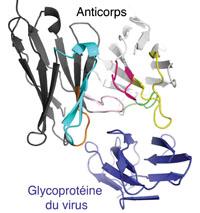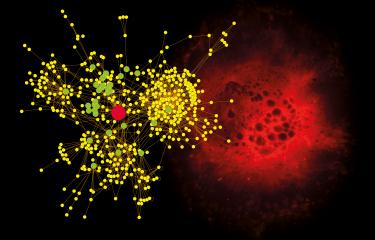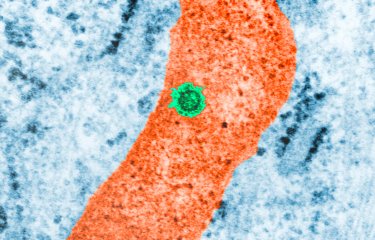Research teams from the Institut Pasteur, the CNRS, and Inserm have recently characterized the structure and mechanism of action of an antibody that successfully neutralizes all four strains of the dengue virus in mice models. Their groundbreaking work represents major progress for research efforts that hope to develop an effective vaccine to combat this disease. This study was published February 8, 2012 in the scientific journal Structure.
Press release
Paris, February 10th, 2012

Research teams from the Institut Pasteur, the CNRS, and Inserm, led by Félix Rey* and Hugues Bedouelle** (Institut Pasteur/CNRS), have, for the first time, succeeded in characterizing an antibody capable of neutralizing all four strains of the dengue virus in mice models. By using comparative analyses and high-resolution crystallography, Félix Rey’s team was able to visualize the way the antibody binds to the virus on the specific recognition sites of each strain.
The teams also showed that the antibody recognizes the surface protein of the virus with varying affinities and neutralization potencies according to the viral serotype (1, 2, 3 or 4), but that the neutralization mechanism is the same in each case. It involves irreversible disruption of the virus particle, rendering it harmless.
These results provide a novel molecular basis for understanding antibody neutralization of the four dengue viruses, and will undoubtedly help to design a safe, protective vaccine.
Financing for this work was provided by the Merck Serono chair, the French National Research Agency (ANR), the EMBO Long Term Fellowship, the French Ministry of Defense, and DENFRAME, the European program for dengue research.
* Félix Rey, head of the Structural Virology Unit (Institut Pasteur / CNRS URA 3015)
** Hugues Bedouelle, Molecular Prevention and Therapy of Human Diseases Unit (Institut Pasteur / CNRS URA 3012)
Source
Mechanism of dengue virus broad cross-neutralization by a monoclonal antibody, Structure, February 8th, 2012
Joseph J. B. Cockburn1,2, M. Erika Navarro Sanchez1,2, Nickolas Fretes1,2, Agathe Urvoas3,4, Isabelle Staropoli5,6, Carlos M. Kikuti1,2, Lark L. Coffey7,8, Fernando Arenzana Seisdedos5,6, Hugues Bedouelle3,4, and Felix A. Rey1,2
1 Institut Pasteur, Unité de Virologie Structurale, Département de Virologie, 75724 Paris Cedex 15, France
2 CNRS, URA3015, 75724 Paris Cedex 15, France
3 Institut Pasteur, Unité de Recherche Prévention et Thérapie Moléculaires des Maladies Humaines, Département d’Infection et Epidémiologie, 75724 Paris Cedex 15, France
4 CNRS, URA3012, 75724 Paris Cedex 15, France
5 Institut Pasteur, Unité de Pathogénie Virale, Département de Virologie, 75724 Paris Cedex 15, France
6 INSERM, U819, 75724 Paris Cedex 15, France
7 Groupe à 5 ans Populations Virales et Pathogenèse, Département de Virologie, 75724 Paris Cedex 15, France
8 CNRS, URA3015, 75724 Paris Cedex 15, France




